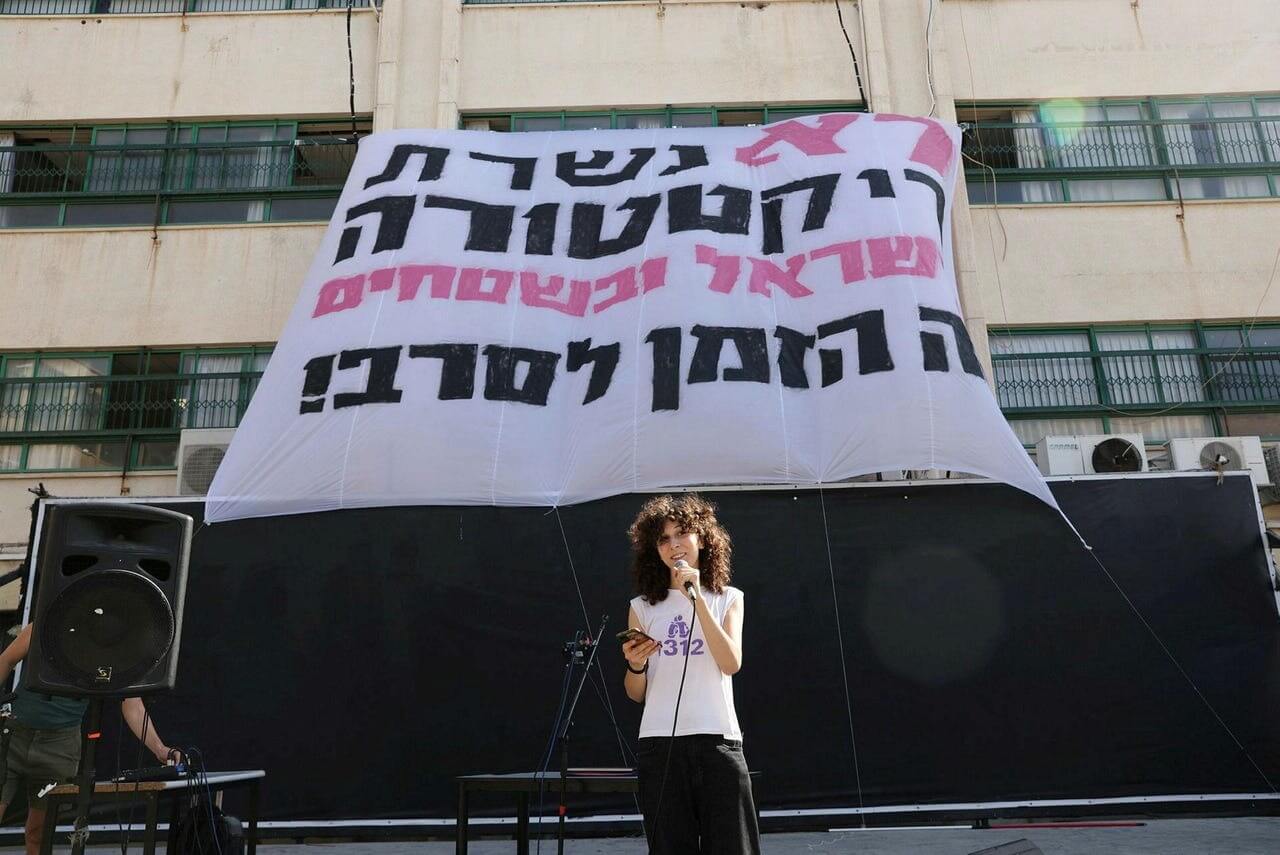‘The overhaul opened their eyes’: Israeli youth publicly refuse draft
Over 200 Israeli high school students declared they will refuse to serve in the IDF ‘due to the ongoing dictatorship in the occupied territories, and the developing dictatorship inside Israel’

Graphic by Angelie Zaslavsky
This article originally appeared on Haaretz, and was reprinted here with permission. Sign up here to get Haaretz’s free Daily Brief newsletter delivered to your inbox.
Despite opposition from the school board, a warning from the Education Ministry and the resignation of the school’s principal over the event, the grounds of Herzliya Hebrew Gymnasium, a historic Tel Aviv high school, hosted a protest on Sunday that represented a step up from the demonstrations against Israel’s judicial coup.
A crowd of older protesters in sunhats, interspersed with pierced teens, stood facing a stage where a letter was displayed, signed by over 200 Israeli students. “We, teenagers who are about to draft, say no to dictatorship – both in Israel and in the occupied Palestinian Territories – and announce that we will not draft until democracy is guaranteed to all, to everyone who lives under Israeli rule,” it read.
“It started with the letter, which began with a conversation between me and a few friends,” says Ella, a 16-year-old 12th grader who helped spearhead the initiative. It serves as the basis for their new organization: Youth Against Dictatorship.
“We’re a group of teens, most of us in 11th and 12th grade, some of us have just finished 12th grade,” she says. “We’re all in the draft process, and know that we’re not prepared to take part in the military regime due to the ongoing dictatorship in the occupied territories, and the developing dictatorship inside Israel.”
To help the event come to fruition, the organizers forged ties with other groups – Banki, the Jewish-Arab communist youth group; the One Climate coexistence and environmental group; the transgender social justice group Gila Project; Breaking the Silence and others. These groups also led discussion sessions with the participants, but despite their engagement, the teens ran the event. The elderly anti-judicial coup protesters were just welcome guests on the youth’s home turf.
This became most apparent when gatecrashers arrived, in the form of the right-wing movement Im Tirtzu. Although their presence was scant – a mere handful of men – it was particularly loud. They brought megaphones and speakers and chanted “There’s no legitimacy for [draft] refusal.”
The older anti-judicial coup protesters were quick to get as close to the interlopers as possible, to start heated arguments. “You’re refusers, and you’re violent! Shame on you, antisemites,” one Im Tirtzu member shouted, as a member of the mothers’ protest group followed him around and kept her placard close to his face.
‘A more radical step’
The teens, meanwhile, seemed exasperated with the display. “Go up to where the stage is,” they patiently called into megaphones of their own, shepherding the adults back to the grassy hill for the main event, “There’s no need to give them any attention.”
Onstage, the teens spoke candidly and confidently about their decisions to not serve, employing a lexicon from social justice and academia that contrasted drastically with the Saturday night judicial coup protests. They had more than Prime Minister Benjamin Netanyahu’s government in their crosshairs. They excoriated the generations – including those present – that were comfortable with the status quo, which laid the groundwork for the present situations. When one speaker mentioned the “Ashkenazi hegemony,” an older woman near the stage audibly huffed.
They are not opposed to the mainstream protests, though. In the words of Tal Mitnick, who finished 12th grade in June and helped draft the letter, they were part of the genesis of the teens’ initiative – which aims to take the demonstration further.
“In the past six months, we’ve been protesting at Kaplan, in the main anti-judicial reform protest, and we realized that we have to take a more radical step as young people ahead of military service – a more radical step against dictatorship in Israel and in the occupied West Bank,” he said. “We decided that we cannot in good faith serve a bunch of fascist settlers that are in control of the government right now.”
The organization hopes “to show other teenagers ahead of their service that there’s another option – an option of peace and fulfillment and justice for all the oppressed communities in Israel, including women, LGBTQ people, Mizrahi people and Palestinians. It’s basically necessary for a democracy to be possible – justice for all communities needs to happen,” he said. “We want to show that there’s a large amount of people who won’t serve under this dictatorship that’s been going on for dozens of years in the West Bank.”
Sophie, another 18-year-old recent graduate and member of Youth Against Dictatorship, notes that the judicial coup was an awakening of sorts for many Israelis, even if she had decided to refuse to serve long before it. “My initial reasons were the occupation and the dictatorship in the West Bank, but I know that there are a ton of people who signed the letter, and a ton of them didn’t plan on refusing until the judicial overhaul.”
“The overhaul really opened their eyes to refusing because of it – and opened their eyes politically in general, making them think about the occupation, and how they don’t want to serve in an occupying military,” she adds. “I don’t think you can separate the judicial overhaul and the occupation. You can see that through the people enacting it: Smotrich, Rothman and Ben-Gvir – They’re all settlers.”
‘Refusal is still a dirty word’
For Ella, the protests were a turning point as well. When asked if she had always planned on refusing service, she said no, she had not. “From a very young age, it was clear to me that I didn’t want to hold a rifle,” she laughed. “It grosses me out, I don’t like it. But my opposition to it comes from the dictatorship in Israel and the West Bank… I know I can’t take part in it in any way, shape or form, even if they offer me to be a secretary at some base. It comes from the last six months, from the dialogue around the protests.”
The teens hope to win more of their peers over to the cause, even though the price is high. Sophie notes that her next step is a stay in military prison for her refusal to serve, which will begin in November. Still, she noted that the discourse is changing.
“I think there’s undoubtedly a trend, thanks to the reservists’ refusal to serve as well, and hopefully because of this event, that the word ‘refusal’ itself has even become more mainstream. It’s still treated like a dirty word, but it’s being spoken,” she said.
“There’s been blind obedience for many, many years, and now some kind of block has been removed, and I hope that it’ll cause even more things to happen. Not just stopping the overhaul, but to make this connection that I see as obvious, between the judicial overhaul and occupation, and to take it to the next stage and protest it as well. To understand that going back to the status quo won’t bring security to any of us, not here and not in the occupied territory.”















